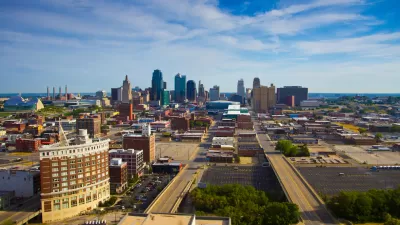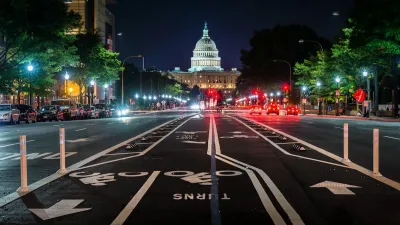A proposed ordinance that would allow neighborhood associations to request removal of bike lanes has sparked a debate over how to prioritize bike and pedestrian infrastructure.

A proposed ordinance regulating bike lanes in Kansas City has sparked a broader debate about "the quality of the city’s streets and sidewalks, about the neighborhoods that are prioritized for improvements and the ones left behind, about equity and whose voices are heard," writes Celisa Calacal.
The ordinance, introduced by Councilwoman Melissa Robinson, drew controversy for its inclusion of language that lets the city remove existing bike lanes at the request of neighborhood associations. The councilwoman says she supports bike lanes, but points to other unmet needs in some of the city's most underserved neighborhoods. According to Robinson, "The deepest socially and economically disadvantaged communities depend on public transit, and their mobility is walking." For her, this signals a need for boosting funding for sidewalk repairs and improvements. But complete streets advocates reject Robinson's framing of bike lanes and sidewalks as priorities in opposition to each other.
While Robinson says the ordinance is meant to respond to resident concerns, Michael Kelley, policy director of BikeWalkNC, notes that the position of neighborhood associations often doesn't include "a whole swath of the community that deserves to have a say in improvements, which will impact their safety." The debate continues as the city moves forward with the ordinance.
FULL STORY: How an ordinance over bike lanes became a flashpoint for conversations about Kansas City infrastructure

Alabama: Trump Terminates Settlements for Black Communities Harmed By Raw Sewage
Trump deemed the landmark civil rights agreement “illegal DEI and environmental justice policy.”

Study: Maui’s Plan to Convert Vacation Rentals to Long-Term Housing Could Cause Nearly $1 Billion Economic Loss
The plan would reduce visitor accommodation by 25% resulting in 1,900 jobs lost.

Why Should We Subsidize Public Transportation?
Many public transit agencies face financial stress due to rising costs, declining fare revenue, and declining subsidies. Transit advocates must provide a strong business case for increasing public transit funding.

Paris Bike Boom Leads to Steep Drop in Air Pollution
The French city’s air quality has improved dramatically in the past 20 years, coinciding with a growth in cycling.

Why Housing Costs More to Build in California Than in Texas
Hard costs like labor and materials combined with ‘soft’ costs such as permitting make building in the San Francisco Bay Area almost three times as costly as in Texas cities.

San Diego County Sees a Rise in Urban Coyotes
San Diego County experiences a rise in urban coyotes, as sightings become prevalent throughout its urban neighbourhoods and surrounding areas.
Urban Design for Planners 1: Software Tools
This six-course series explores essential urban design concepts using open source software and equips planners with the tools they need to participate fully in the urban design process.
Planning for Universal Design
Learn the tools for implementing Universal Design in planning regulations.
Smith Gee Studio
Alamo Area Metropolitan Planning Organization
City of Santa Clarita
Institute for Housing and Urban Development Studies (IHS)
City of Grandview
Harvard GSD Executive Education
Toledo-Lucas County Plan Commissions
Salt Lake City
NYU Wagner Graduate School of Public Service





























